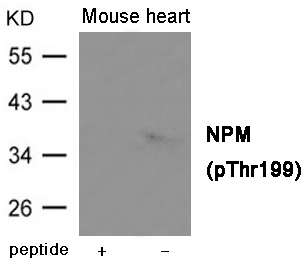Product Detail
Product NameNPM (Phospho-Thr199) Antibody
Host SpeciesRabbit
ClonalityPolyclonal
PurificationAntibodies were produced by immunizing rabbits with synthetic phosphopeptide and KLH conjugates. Antibodies were purified by affinity-chromatography using epitope-specific phosphopeptide. Non-phospho specific antibodies were removed by chromatogramphy using non-phosphopeptide.
ApplicationsWB
Species ReactivityHu Ms
SpecificityThe antibody detects endogenous level of NPM only when phosphorylated at Threonine 199.
Immunogen TypePeptide-KLH
Immunogen DescPeptide sequence around phosphorylation site of Threonine 199
(R-D-T(p)-P-A) derived from Human NPM.
Target NameNPM
Other NamesB23, NPM
Accession NoSwiss-Prot#: P06748;
NCBI Gene#: 4869;
NCBI Protein#: NP_001032827.1
Uniprot
P06748
Gene ID
4869;
Sdspage MW32, 38kd
Concentration1.0mg/ml
FormulationSupplied at 1.0mg/mL in phosphate buffered saline (without Mg2+ and Ca2+), pH 7.4, 150mM NaCl, 0.02% sodium azide and 50% glycerol.
StorageStore at -20˚C/1 year
Application Details
Predicted MW: 32£¬38kd
Western blotting: 1:500~1:1000
Western blot analysis of extracts from Mouse heart tissue using NPM (Phospho-Thr199) Antibody #12031.The lane on the left is treated with the antigen-specific peptide.
Involved in diverse cellular processes such as ribosome biogenesis, centrosome duplication, protein chaperoning, histone assembly, cell proliferation, and regulation of tumor suppressors p53/TP53 and ARF. Binds ribosome presumably to drive ribosome nuclear export. Associated with nucleolar ribonucleoprotein structures and bind single-stranded nucleic acids. Acts as a chaperonin for the core histones H3, H2B and H4. Stimulates APEX1 endonuclease activity on apurinic/apyrimidinic (AP) double-stranded DNA but inhibits APEX1 endonuclease activity on AP single-stranded RNA. May exert a control of APEX1 endonuclease activity within nucleoli devoted to repair AP on rDNA and the removal of oxidized rRNA molecules. In concert with BRCA2, regulates centrosome duplication. Regulates centriole duplication: phosphorylation by PLK2 is able to trigger centriole replication. Negatively regulates the activation of EIF2AK2/PKR and suppresses apoptosis through inhibition of EIF2AK2/PKR autophosphorylation.
If you have published an article using product 12031, please notify us so that we can cite your literature.



 Yes
Yes



